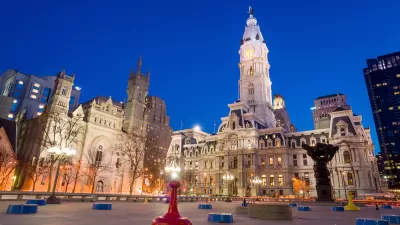The legislative quid pro quo is being used by members of the city council for the wrong reasons, leaving neighborhoods throughout the city in limbo.

Inga Saffron writes about the history and impacts of Philadelphia’s councilmanic prerogative, a practice that gives individual district councilmembers an inordinate amount of decision-making power:
Although the name sounds genteel and mannerly, the maneuver can turn an ordinary, mild-mannered district councilperson into power-mad feudal lord. No matter what craziness a local representative proposes, the rest of Council will vote in lockstep, no questions asked, knowing the favor will be returned when they want approval for a special measure in their own district. Usually the special bills involve property sales and zoning.
The Home Rule Charter in Philadelphia supports the prerogative, says Saffron, because it gives the city council final say on land sales and zoning changes and limits the authority of the planning commission.
Councilmembers have halted, thwarted, or left in limbo project after project through use of the prerogative, also known as "legislative courtesy," in their political wheeling and dealing. When projects do not move forward, the result is lingering blight, destruction of neighborhoods, and compromised public safety, says Saffron.
The prerogative violates the basic role of the legislature as part of a system of checks and balances, argues Saffron. She wants to see it eliminated, but she is not confident this will ever happen. "If Philadelphia ever hopes to realize its potential as a modern city, it’s going to need a constitution fit for the 21st century anyway. One where councilmanic prerogative doesn’t have the final word on the look of the city."
FULL STORY: How an obscure City Council rule leaves a trail of blight in Philadelphia

Maui's Vacation Rental Debate Turns Ugly
Verbal attacks, misinformation campaigns and fistfights plague a high-stakes debate to convert thousands of vacation rentals into long-term housing.

Planetizen Federal Action Tracker
A weekly monitor of how Trump’s orders and actions are impacting planners and planning in America.

Chicago’s Ghost Rails
Just beneath the surface of the modern city lie the remnants of its expansive early 20th-century streetcar system.

Bend, Oregon Zoning Reforms Prioritize Small-Scale Housing
The city altered its zoning code to allow multi-family housing and eliminated parking mandates citywide.

Amtrak Cutting Jobs, Funding to High-Speed Rail
The agency plans to cut 10 percent of its workforce and has confirmed it will not fund new high-speed rail projects.

LA Denies Basic Services to Unhoused Residents
The city has repeatedly failed to respond to requests for trash pickup at encampment sites, and eliminated a program that provided mobile showers and toilets.
Urban Design for Planners 1: Software Tools
This six-course series explores essential urban design concepts using open source software and equips planners with the tools they need to participate fully in the urban design process.
Planning for Universal Design
Learn the tools for implementing Universal Design in planning regulations.
planning NEXT
Appalachian Highlands Housing Partners
Mpact (founded as Rail~Volution)
City of Camden Redevelopment Agency
City of Astoria
City of Portland
City of Laramie




























